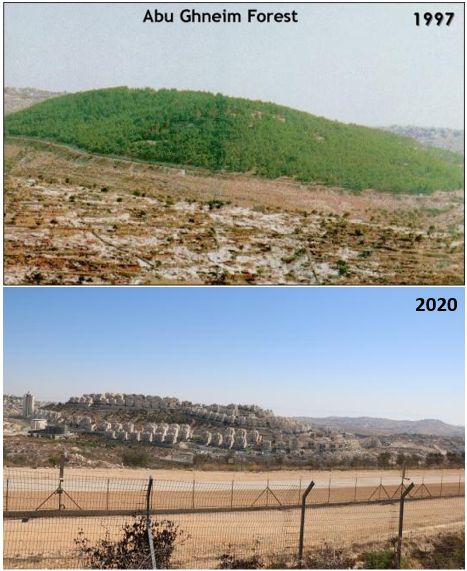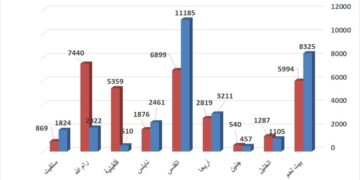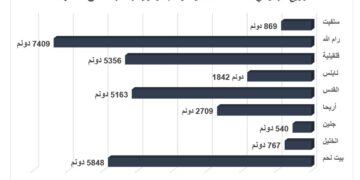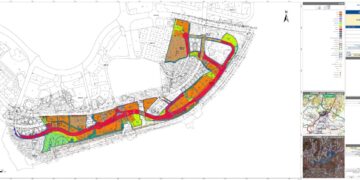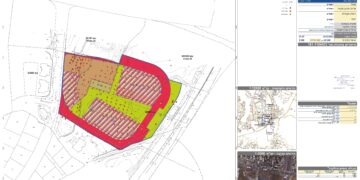On the 24th of October 2021, the Israeli housing and construction ministry of the right-wing Naftali Bennett’s government, launched tenders for 1,355 settlement units in a number of Israeli settlements in the occupied West Bank. Most of the targeted settlements are located mainly in the area that has been cut-off by the construction of the wall along the western terrains of the occupied West Bank, and which has become known to Palestinians since then by “the western segregation zone”, the area between the 1949 Armistice (Green Line) and the route of the wall.
This latest Israeli announcement adds to dozens others that were deposited by the Israeli Government since the beginning of 2021 and targeted more than 40 Israeli settlements in the occupied West Bank with more than 11,000 units awaiting to be constructed on more than 8600 dunums of Palestinian land.
Following the Israeli announcement of the new settlement units in the occupied West Bank, the US issued its strongest public criticism of Israel’s plans to construct new settlement units, saying, “We strongly oppose the expansion of settlements, which is completely inconsistent with efforts to lower tensions and restore calm; and it damages the prospects for a two-state solution.”
Although the consecutive US administrations have long sought, a resolution (or a peace process) to the Israeli Palestinian conflict that would see a two-state solution; the US on the other hand, has been a very strong supporter of Israel since its establishment, and provided it with billions of dollars in military aid yearly. In August 2007, the Bush Administration agreed to increase the U.S. military aid to Israel by $6 billion over the coming decade (2008-2018). Later in September 2016, the US administration, under President Barack Obama, and the Israeli government signed a new ten-year Memorandum of Understanding (MOU) on military aid covering 2019 to 2028, where the US to provide Israel with a record $38 billion in military aid.
Over the years, the US has also used its veto power several times against UN resolutions condemning the construction of settlements and their illegality in the West Bank, the last of which was in February 2011, when the US vetoed a Security Council resolution condemning all Israeli settlements established in occupied Palestinian territory since 1967 as illegal, claiming that “the resolution harmed chances for peace talks”. Other US vetoes against UN Resolutions condemning Israeli settlements were also blocked back in 1983[1] and 1997.
Despite all, Israel’s settlement activities in the occupied West Bank continued and reached unprecedented dimensions on the ground. Today there are more than 918,000 settlers living in 199 settlements in the occupied West Bank including East Jerusalem. The settlement activities are determining the course of the ongoing conflict and are imposing facts on the ground, disrupting the landscape of what Palestinians aspire as a “future Palestinian state”.
Israel’s slap at Biden
Back in March 2010 when as then-Vice President Joe Biden was visiting Israel and the West Bank, Israel sanctioned plans to construct 1,600 additional housing units in Ramat Shlomo settlements in occupied East Jerusalem, embarrassing Biden and the US administration in the midst of the visit. Biden had the same opinion back then, slamming Israel’s plan to build the units, saying that “the decision by the Israeli government to advance planning for new housing units in East Jerusalem undermines that very trust, the trust that we need right now in order to begin … profitable negotiations”[2].
Prior to that, in 1982, Biden was among a group of US congressional representatives who had a contentious meeting with then-Israeli Prime Minister Menachem Begin[3] in Washington. Biden reportedly pressured Begin to halt the construction of Israeli settlements in the occupied West Bank, while some of his colleagues criticized other parts of Israeli policy.[4]
Israel, historically, has opposed the United States leaders several times. At the start of Barack Obama’s presidency in 2009, the fundamental aspect of the US approach was persuading the Israeli government to pledge to a freeze on construction in Israeli settlements in the West Bank. When Israeli Prime Minister Benjamin Netanyahu refused, this initial strategy fell apart. The two parties eventually agreed to a nine-month partial freeze that lasted until late September 2010; however, Israel has continued to build settlements in occupied East Jerusalem, sending a message in more than one direction, to the Israeli public, telling them that Jerusalem will remain out of any negotiation and business (construction) there is as usual. Such a message also goes to the Palestinians and the United States and the European Commission that Israel will not include East Jerusalem within any obligation it might be pressured to make to freeze settlements construction in the occupied Palestinian territory.
Additionally, on 19 May 2011, President Obama delivered a foreign policy speech, in which he called for a return to the pre-1967 borders with mutually agreed-upon land swaps.[5] The Israeli government instantly protested Obama’s call, claiming that returning to its pre-1967 borders would render Israel “indefensible.” The US president did not also pursue his call with a clear strategy or actions to fulfill his call in order to resolve the Palestinian-Israeli conflict.
The Security Council resolution 2334 (of 2016) reaffirmed that Israel’s establishment of settlements in Palestinian territory occupied since 1967, including East Jerusalem, had no legal validity and constituted a flagrant violation of international law, as well as a major impediment to the achievement of the two-State solution and a just, lasting, and comprehensive peace. “Immediately and completely cease all settlement activity in the Occupied Palestinian Territory, including East Jerusalem”. However, demolition of Palestinian homes and livelihoods, and seizures of Palestinian-owned land continued throughout the occupied West Bank. [6]
A series of tensions between the Biden administration and the Israeli government appeared to be rising also last month after Israel labeled six Palestinian non-governmental organizations (NGOs) in the occupied West Bank as “terrorist organizations.” On 3 November 2021, the Israeli military commander signed a military order that criminalizes six Palestinian civil society organizations throughout the occupied West Bank. According to the military order, “every member of the institution, whether he is incorporated/associated with it or not, whether he operates on the internet or in another way, and every group, cell and faction, institution, central branch or faction thereof, and whatever name is called, including any member or belonging person to this stream, known by various aliases, is an illegal organization in the meaning of the defense regulations.” [7] However, European countries were not persuaded by Israel’s secret dossier, which was prepared by Israel’s internal security service, the Shin Bet, and handed to them explaining its designation of six Palestinian rights organizations as terrorist organizations.[8]
Later on 9 November 2021, and as part of a broad text in favor of the UN Relief and Works Agency (UNRWA), the Biden administration abstained – but did not reject – a General Assembly resolution recognizing the right of Palestinian refugees to return to the occupied Palestinian territory. “This year, the United States returns to a position of abstention on the text ‘Assistance to Palestine Refugees,’” American Deputy Ambassador Richard Mills told the Fourth Committee of the UN General Assembly.[9] The Biden administration’s decision to move from a vote against the text to an abstention is a clear change in US voting patterns, set by his predecessor, Donald Trump, who in 2018, had opposed UNRWA’s work and halted US financing to the agency. However, despite the US’s abstention on the issue of Palestinian refugees, the US voted against other draft resolution set by the UNRWA regarding “Palestine refugees’ properties and their revenues” which requests the UN General Assembly to “take all appropriate steps to protect Arab properties, assets and property rights in Israel.”
Moreover, in a move to return to the pre-Trump status-quo and as part of President Joe Biden’s plan to renew relations with the Palestinians that were severed during the Trump Administration, some US officials informed the Palestinian Authority of their intention to reopen the US consulate in Jerusalem, which served Palestinians from the West Bank, East Jerusalem and the Gaza Strip before 2018. The consulate was closed by Biden’s predecessor- President Donald Trump in 2019 and its staff were moved to the US embassy which was moved from Tel Aviv to Jerusalem in 2018. Israel publically stepped up its rejection to the US move, claiming that it would jeopardize its authority over the city and that it will lead to a flood of other countries opening their diplomatic missions/offices in Jerusalem to serve the Palestinians. Israel also suggested that the consulate be opened in the occupied West Bank, hinting that Jerusalem is out of the question.
To conclude,
Israeli settlements are viewed as an obstacle to peace by the current Biden administration. However, during the Trump administration, the US has changed its position on Israeli settlements in the occupied West Bank, no longer considering them illegal under international law.
Additionally, during the Trump administration, the quartet[10] also fell largely inactive and this was seen by the Palestinian Authority as direct bias towards and therefore lost all credibility.
Over the years, the US failed to broker a peace deal between the Palestinians and the Israelis despite its long commitment to a two-state solution to the conflict, but in practice, the US has done a little to push Israel into a real and honest peace deal with the Palestinians. The problem lies in that the United States sets itself as the only broker to the Israeli- Palestinian issue and continues to ignore its role as part of the Quartet to push for a real peace deal between the two sides.
- [1] https://www.un.org/en/ga/search/view_doc.asp?symbol=S/15895
- [2] Adam Entous, M. (2021). Biden scolds Israel over settlement plan. Retrieved 8 November 2021, from https://www.reuters.com/article/us-usa-israel-biden-idUSTRE6271YE20100310
- [3] 6th Prime Minister of Israel – served in office from 20 June 1977 – 10 October 1983
- [4] Biden’s decades-long pattern with Israel: Public support, private scolding. (2021). Retrieved 30 October 2021, from https://www.timesofisrael.com/bidens-decades-long-pattern-with-israel-public-support-private-scolding/
- [5] Israel Objects to Obama Remarks on Borders. (2021). Retrieved 3 November 2021, from https://www.voanews.com/a/israel-objects-to-obama-remarks-on-borders-122267399/139630.html
- [6] Implementation of Security Council resolution 2334 (2016) – Report of the Secretary-General (S/2021/584) [EN/AR] – occupied Palestinian territory. (2021). Retrieved 3 November 2021, from https://reliefweb.int/report/occupied-palestinian-territory/implementation-security-council-resolution-2334-2016-report-2
- [7] Alert: Israel Takes Alarming Steps to Enforce its Persecution of Six Palestinian Organisations in the West Bank, International Community Must Intervene. (2021). Retrieved 16 November 2021, from https://www.alhaq.org/advocacy/19179.html
- [8] Israel fails to convince Europe, US of terror label for Palestinian groups. (2021). Retrieved 16 November 2021, from https://www.aa.com.tr/en/middle-east/israel-fails-to-convince-europe-us-of-terror-label-for-palestinian-groups/2414949
- [9] US changes its UN vote from ‘no’ to ‘abstention’ on UNRWA affirmation. (2021). Retrieved 13 November 2021, from https://www.jpost.com/international/us-changes-its-un-vote-from-no-to-abstention-on-unrwa-affirmation-684542
- [10] The Quartet on the Middle East or Middle East Quartet, is a foursome of nations and international and supranational entities involved in mediating the Israeli–Palestinian peace process. The Quartet comprises the United Nations, the United States, the European Union, and Russia.
Prepared by:
The Applied Research Institute – Jerusalem


